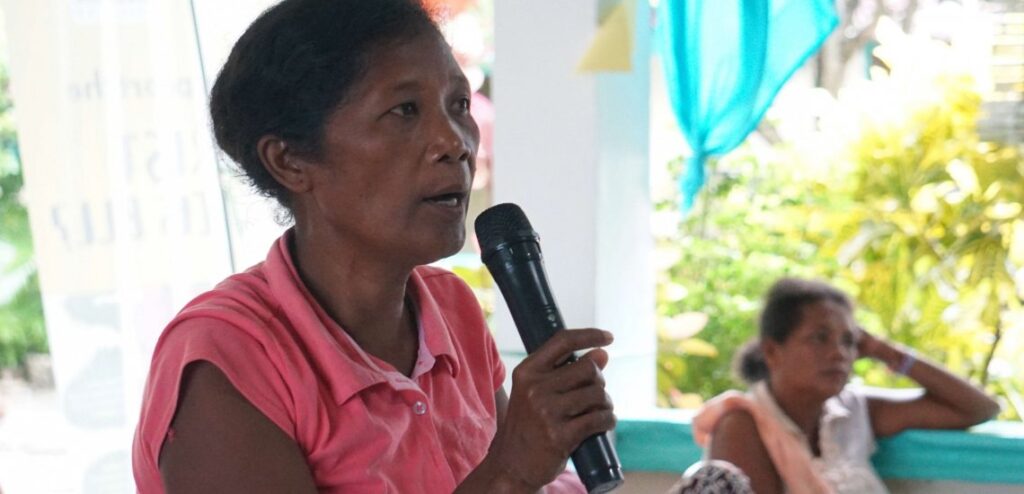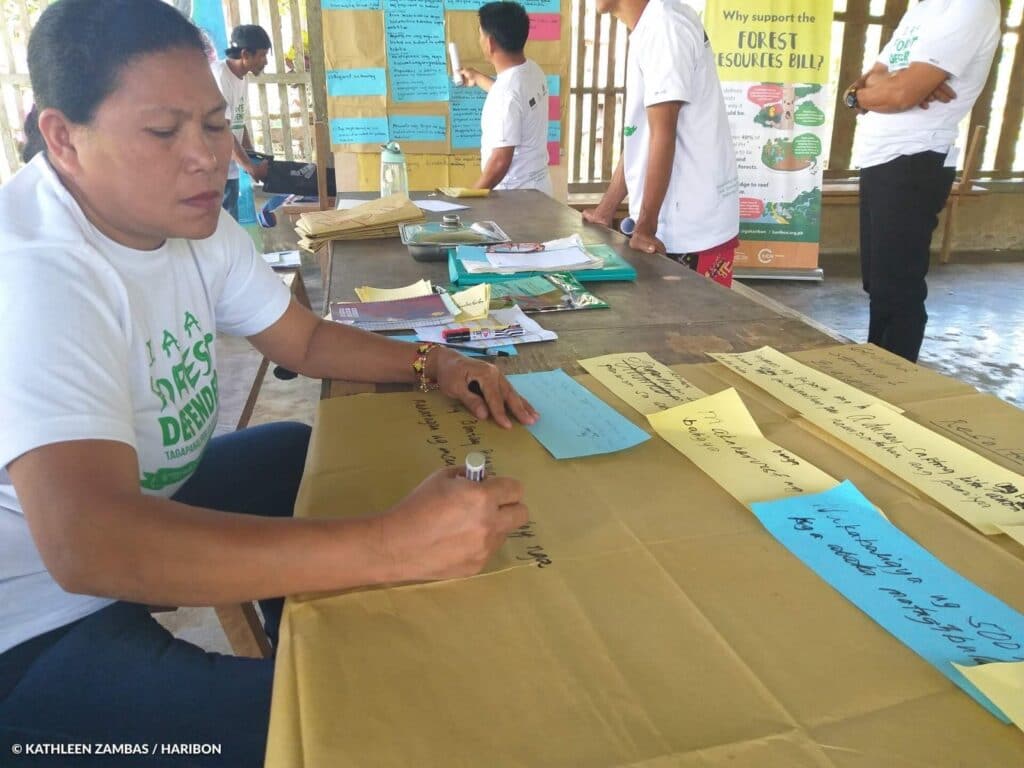Meet the female forest defenders of the Philippines

Hear the stories of the inspirational Filipino women unafraid to take a stand against the destruction of their forest homes, and how we’re fighting for their right to a healthy environment.
The loss and degradation of forests and nature is increasingly impacting the ways of life of indigenous and local communities across the world who have fought, sometimes risking their lives, against the destruction of their ancestral homes. In the Philippines, they are seeing their homes damaged by illegal logging, slash-and-burn farming and mining activities, with little say in the matter. To help empower them, the Haribon Foundation, as part of the European Commission-funded Asia-Pacific Forest Governance project* coordinated by BirdLife International, has been providing training and support since 2017 on how to protect the forests within three Key Biodiversity Areas – Mount Hilong-Hilong, Mount Irid-Angelo and Mount Siburan.
Indigenous people have always had first-hand knowledge of the forest – but in many cases, they had never been given formal support or training on how best to monitor this habitat, a key aspect of management. Weak forest law enforcement and compliance show that there is an urgent need for change. And so the Haribon Foundation met and collaborated with local communities to select a team of volunteer forest watchers, training them in important subjects such as environmental law, business planning and forest monitoring. Armed with this knowledge, the volunteer indigenous forest defenders, known as Bantay Gubat (or Bantay Banwa in Mindanao) have been monitoring forest condition and acting to prevent forest degradation and deforestation.
Approximately half of the Bantay Gubat who have taken on this role are women. Despite the risks associated with activism, these indigenous women have recognised the need to act to defend their forests not just for the sake of their communities, who live in and around them, but also for the global ecological and climatic benefits of the forests.
More widely, biodiversity supports the ecosystem services that underpin all the Sustainable Development Goals and a wide range of human rights, including the rights to life, health, food, water and culture. By defending the environment, the Bantay Gubat are therefore defending human rights; and by empowering women indigenous forest defenders, the project is also supporting the rights of both women and indigenous people – groups that are all-too-often marginalised in natural resource management and decision-making.
Kathleen Zambas, Training Specialist with the Haribon Foundation, works closely with female forest defenders in the Philippines as part of the Asia-Pacific Forest Governance project. Below, she introduces us to some of the inspirational women defending their right to a healthy environment.
By Léa Kaplani & Kathleen Zambas
Header image © Princess del Castillo

Kathleen: While on a bus en route to Tandag City, I noticed a kid beside me reading the print on my t-shirt: Forest Defender. Upon reading the words, the child asked, “What is a forest defender? Who are they?” I told her that forest defenders are brave people who protect the forest from destroyers. “Aren’t they the people with big shields? Those men who roam around the forest with a bow and arrow?” she asked again, possibly out of curiosity.
This is the perception that many people have about forest defenders; that they are men who patrol and guard the forest against wrongdoers. While this may be true in certain places, Indigenous Peoples in the Philippines challenge this popular notion by demonstrating that it takes all sorts of skillsets to protect a forest.
Among them are three amazing women forest defenders – Bae Elma Bauzon, Bae Virgilia Juagpao, and Ka Ningning Aztovesa – each voluntarily engaging in protecting the forests of their ancestral domains. They are leading their communities in preserving their heritage as well as actively participating in activities to become better forest managers themselves – and all in their own remarkable ways.

The patriarchal system in the Manobo tribe did not stand in the way of Bae Elma helping her community to conserve the forests of Mt Hilong-Hilong, one of BirdLife’s Asia-Pacific Forest Governance project priority sites. Bae Elma is the sole woman in their Bantay Banwa group, where she holds responsibility for a variety of duties. Besides serving as the group’s secretary, she helps to organise the members’ training activities and facilitates discussions and workshops.
“I don’t need to be in an official capacity to be able to serve for our ancestral domain,” said Bae Elma, whose influence resonates beyond the Bantay Banwa group to the whole community of Manobo.
This reminded me of something the late Senator Miriam Santiago said: “If you want to make a difference… you need to be a leader on your own…You do not need to have a title or be a boss to become a leader.” This certainly rings true in the life of Bae Elma Bauzon, who leads her community despite not being a title holder in her tribe’s council.

Melinda Gates said, “A woman with a voice is by definition a strong woman”, and Bae Virgilia Juagpao perfectly embodies that definition. She is a strong woman, one who uses her voice to create positive change. As the tribal leader, and former Barangay Indigenous People’s Representative (IPMR) of the Mamanwa-Manobo tribe, her voice propels her community.
She is one of the six women who are part of her tribe’s Bantay Banwa group, where she actively speaks on behalf of her fellow Mamanwas during consultations on forest governance. Bae Virgilia also represents her tribe in training and discussions on protection and law enforcement within their forest home.
“I will voice this out on behalf of the others who couldn’t speak,” said the forest defender, whose voice inspires her whole community to find theirs as well.

Ka Ningning is a woman who was born to lead the Dumagats of Nakar in defending their forest. Being the tribal chieftain of Sitio Tinipak, Ka Ningning puts herself on the frontlines to protect their land and their rights as indigenous people.
She is a female leader among the Kaksaan (chieftains), and also a Bantay Gubat who leads discussions on establishing a Bantay Gubat group within their community. She also takes the helm during consultations on current issues that pose threats to their forest. One such threat is the proposed development of Kaliwa Dam, the building of which puts the tribe in danger of being displaced.
Ka Ningning is a forest defender who is willing to sacrifice her life “in the name of service for our environment,” she said. She is the leader paving the way for her community to make their stand in defending what is rightfully theirs.
These three remarkable women stand as living proof that women are more than capable of doing what many people mistakenly think of as “men’s jobs”. Ultimately, they are great leaders willing to go above and beyond for their community, and an inspiration to women everywhere to be bold in protecting their human rights.
*More about the project
Title: Strengthening non-state actor involvement in forest governance in Indonesia, Malaysia, the Philippines, and Papua New Guinea
Lead Partner: BirdLife International
National Partners: Burung Indonesia (BirdLife Indonesia); Malaysian Nature Society (BirdLife Malaysia); Haribon Foundation (BirdLife in the Philippines); Tenkile Conservation Alliance (Papua New Guinea).
Training and Technical Partners: University of Papua New Guinea; Centre for International Development & Training
Funded by: European Union

www.birdlife.org/forest-governance
The contents of this publication are the sole responsibility of BirdLife International and can in no way be taken to reflect the views of the European Union.